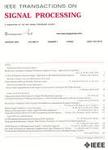版权所有:内蒙古大学图书馆 技术提供:维普资讯• 智图
内蒙古自治区呼和浩特市赛罕区大学西街235号 邮编: 010021

作者机构:Univ Southern Calif Ming Hsieh Dept Elect & Comp Engn Los Angeles CA 90007 USA
出 版 物:《IEEE TRANSACTIONS ON SIGNAL PROCESSING》 (IEEE Trans Signal Process)
年 卷 期:2022年第70卷
页 面:4170-4185页
核心收录:
基 金:National Science Foundation [CCF-1817200] ARO [W911NF1910269] Cisco Foundation DOE [DE-SC0021417] Swedish Research Council [2018-04359] NSF [CCF-2008927] ONR [503400-78050, N00014-15-1-2550] Vinnova [2018-04359] Funding Source: Vinnova Swedish Research Council [2018-04359] Funding Source: Swedish Research Council
主 题:Testing Anomaly detection Numerical models Safety Error probability Signal processing algorithms Sensors Anomaly detection chernoff-stein lemma controlled sensing hypothesis testing
摘 要:Determining the presence of an anomaly or whether a system is safe or not is a problem with wide applicability. The model adopted for this problem is that of verifying whether a multi-component system has anomalies or not. Components can be probed over time individually or as groups in a data-driven manner. The collected observations are noisy and contain information on whether the selected group contains an anomaly or not. The aim is to minimize the probability of incorrectly declaring the system to be free of anomalies while ensuring that the probability of correctly declaring it to be safe is sufficiently large. This problem is modeled as an active hypothesis testing problem in the Neyman-Pearson setting. Asymptotically optimal rates and strategies are characterized. The general strategies are data driven and outperform previously proposed asymptotically optimal methods in the finite sample regime. Furthermore, novel component-selection are designed and analyzed in the non-asymptotic regime. For a specific class of problems admitting a key form of symmetry, strong non-asymptotic converse and achievability bounds are provided which are tighter than previously proposed bounds.